November 2023 News: Native American Heritage Month
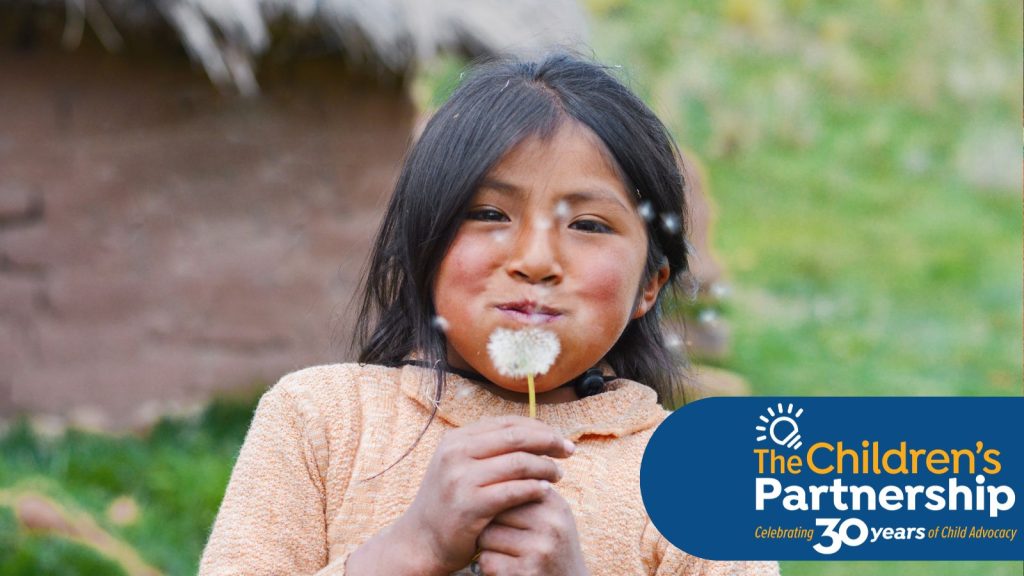
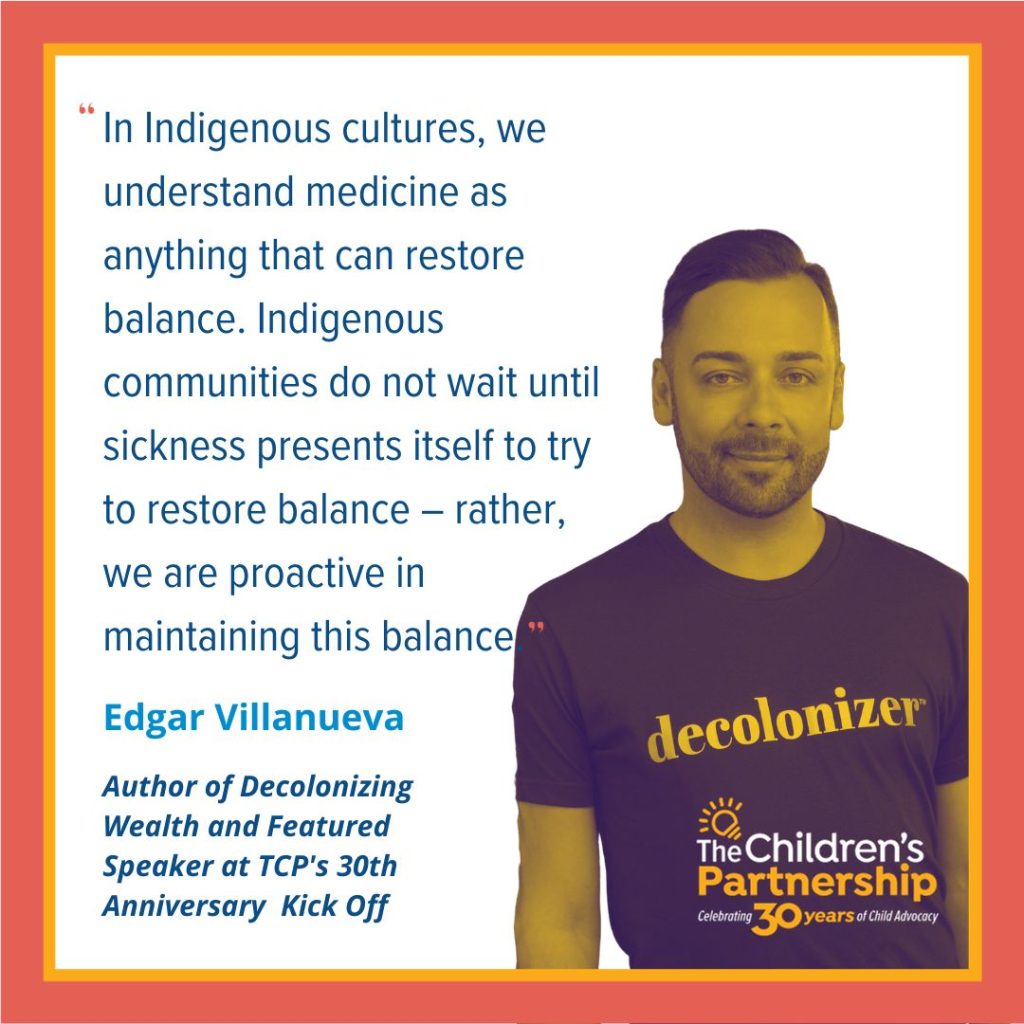
This Native American Heritage Month and always, we remain committed to elevating Indigenous children’s health to the forefront in order to offer us all an opportunity to begin to heal historical wounds and build a future grounded in resilience and empowerment.
Acknowledging the cultural genocide and discrimination faced by Indigenous communities is the first step towards fostering positive change. Embracing a strengths-based approach, we can celebrate the rich tapestry of Indigenous cultures and leverage traditional knowledge as a source of strength and resilience. By dismantling systemic barriers, promoting cultural competency in health care, and ensuring access to quality housing and education, we can create an environment where Native children not only survive but thrive.
Together, we can rewrite the narrative, fostering a society that not only respects but celebrates the unique contributions and perspectives of Indigenous communities, ensuring a brighter and more equitable future for generations to come.

Keep Kids Covered: Sign On to Support Continuous Coverage
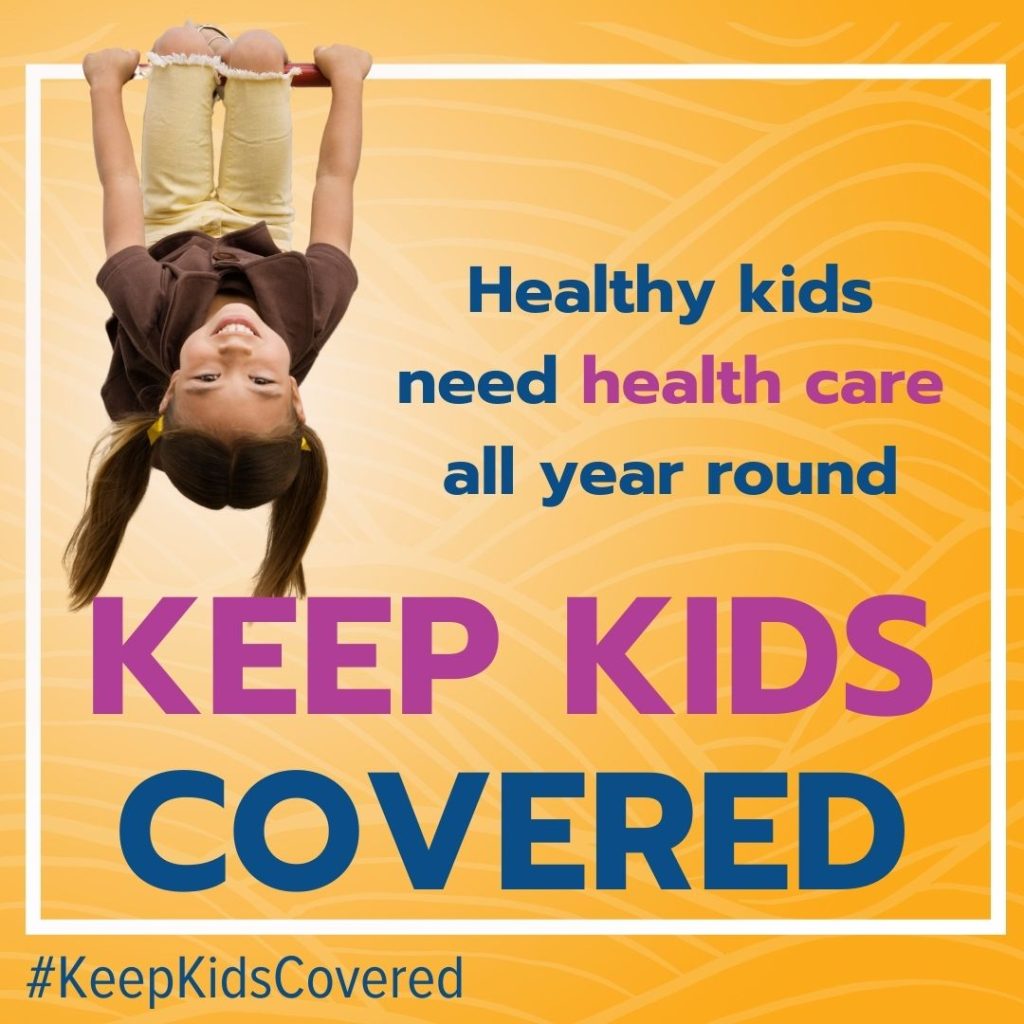
Over half of California’s kids depend on Medi-Cal health care coverage. Yet, families are facing undeserved removal from coverage, and it’s a concerning issue. Since June, a staggering 150,000 children have lost their Medi-Cal coverage due to procedural reasons. It could be because their family didn’t receive a renewal package, encountered confusion while filling out forms, or struggled to reach a Medi-Cal worker due to prolonged call wait times.
Every child has the right to access health care, and Medi-Cal plays a crucial role. It’s imperative that Medi-Cal remains a reliable resource for them. Urgent changes are necessary to prevent more kids and families from losing their Medi-Cal coverage.
Take action now by signing a letter urging Governor Newsom to incorporate Medi-Cal Continuous Coverage in the upcoming January California State Budget.
Together, we can make a difference and ensure health care stability for all.
Navigators and Assisters: Share Your Expertise in Assisting Families with Medi-Cal Renewals
As we go through the process of renewing Medi-Cal, we are dedicated to hearing the perspectives of Medi-Cal families. We’ve teamed up with Lake Research Partners to invite families of color to join focus group sessions and share their experiences and challenges with the renewal process. Additionally, Lake Research will be reaching out to application and renewal assisters to gather insights into their experiences and observations during the renewal process.
Our goal is to share the insights and recommendations with the Department of Health Care Services (DHCS) to address any identified issues. We also plan to share the findings with community organizations that support families, helping them better understand the needs of those they serve.
To show our appreciation for the time and expertise of assisters, we’re offering a $100 stipend for a 2-hour participation. We plan to conduct the focus group virtually in December to capture a diverse range of renewal experiences from assisters across the state. If you or assisters in your organization are interested in taking part, please sign up.
Medi-Cal Renewal Toolkit and Videos
Let’s work together to ensure that families are well-informed about Medi-Cal renewals! The Children’s Partnership and our ALL IN partners are excited to share a special toolkit with schools, child care providers and those who champion the well-being of children and families.
The ALL IN to #KeepKidsCovered Community Outreach Toolkit includes videos to help spread important information to families in California about Medi-Cal renewals. In these videos, community health workers, who work with diverse communities, share valuable insights in various languages like English, Spanish, Punjabi, Tagalog and Chinese. A big ‘thank you’ to community health workers for collaborating with us on creating these informative videos!
Feel free to share these videos by downloading them or providing links on social media, in newsletters or on your website.

Presentation to First 5 LA Housing Dialogue
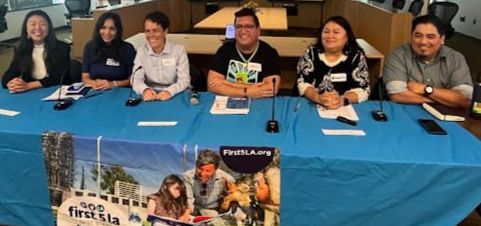
On October 18, The Children’s Partnership (TCP) team partnered with First 5 LA and participants in the Best Start Program for an insightful discussion on health equity and housing justice.
First 5 LA invests in 14 areas that have a history of disenfranchisement and oppression due to political, economic, social and environmental factors, which contribute to ongoing family challenges such as violence and poverty.
During the event, TCP moderated a panel featuring Best Start grantees – Para Los Niños, Rising Communities and Long Beach Forward (in collaboration with Long Beach Residents Empowered (LiBRE). These organizations have made housing justice a priority through community engagement with parents. The panelists delved into how the housing crisis affects their communities, the role of residents in creating a local housing agenda, and their efforts in long-term community empowerment. Following the panel, Maddie Ribble, policy director for social drivers of health, led a discussion on how advocates for children’s health can effectively collaborate to influence housing policy changes at the state and county levels.
TCP is actively supporting health organizations throughout California to unite in endorsing a housing justice policy agenda. This effort is part of the Housing Justice as Health Equity Collaborative, a joint initiative by TCP and our partners at Human Impact Partners. Currently in the planning phase, the Collaborative is set to be publicly launched in the new year.
RACE COUNTS California Racial Disparities Webinar
“Listening to the data uplifted from the RACE COUNTS report provided further validation into the importance of our work at TCP. Investing in the early care and education of our youngest Californians is an investment that requires urgency.” – Eva Rivera
Eva Rivera, our director for early childhood development policy, recently participated in a webinar hosted by Catalyst California and Faith in the Valley. The webinar marked the release of Catalyst California’s 2024 RACE COUNTS report.
RACE COUNTS employs data to equip advocates for change with valuable insights into racial disparities across California. The ultimate goal is to provide tools that empower people to shape public policies addressing the root causes of racism and its resulting inequalities. During the webinar, Eva discussed The Children’s Partnership’s efforts to promote health equity for all children. It is recognized that strategies aimed at dismantling racist outcomes benefit every child.
TCP Showcases Medi-Cal Renewal Resources at Head Start Health Summit: Ensuring Every Child’s Access to Health Care
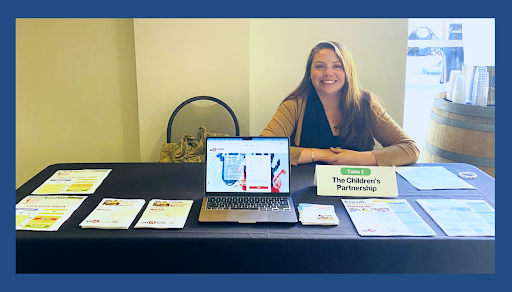
Our partners at Head Start California invited us to present our resources for Medi-Cal renewal at their annual Head Start Health Summit. Liza Davis, our director of community engagement and advocacy, participated in this fantastic event to introduce TCP’s Medi-Cal Renewal Outreach Toolkit to early childhood educators.
The toolkit is designed to simplify the process of reminding and supporting families through the Medi-Cal renewal. Head Start California has been an excellent collaborator in our efforts for Medi-Cal renewal outreach. During the event, Liza engaged with local Head Start providers, addressing their inquiries. Our overarching goal at TCP is to ensure that every child in California has access to health care.
A Child Is a Child Latine Fact Sheet
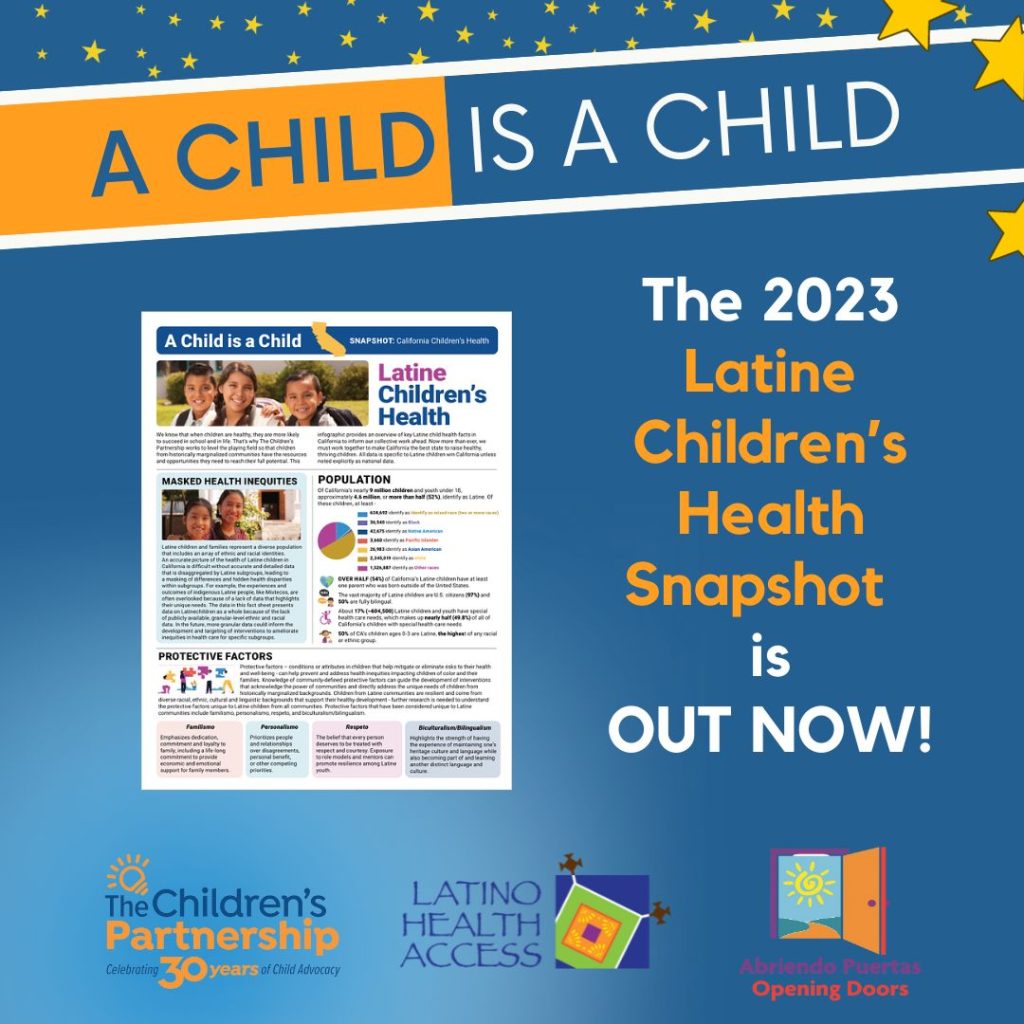
In partnership with Abriendo Puertas and Latino Health Access, we are excited to highlight the health of over 4 million Latine children who live in the state of California. Our A Child Is a Child factsheet uplifts inequities that impact the lives of Latine children and hinder their success and healthy development. It is our hope that advocates, policymakers, parents, guardians, teachers and others use this fact sheet to better understand where systemic inequities exist in order to support changes and become stronger allies to the Latine community.
The data included in the fact sheet highlights
- health care access and coverage,
- food security,
- poverty and child welfare, and
- protective factors
With accurate data, programs and policies can be put in place so Latine children have every opportunity to live healthy, safe and successful lives.
Coming Soon: American Indian & Native Alaskan Children’s Health Factsheet
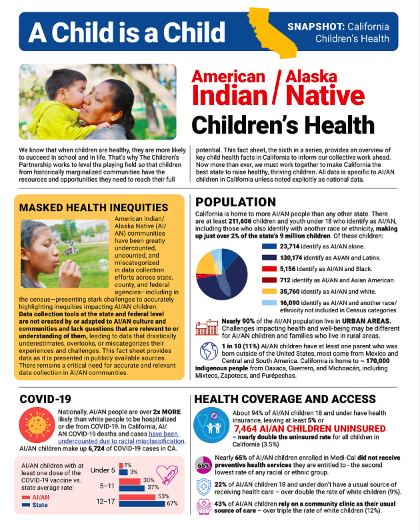
We’re thrilled to continue our work to highlight and center the children of Indigenous communities in California with the upcoming launch of our new A Child Is a Child data snapshot. In collaboration with remarkable Indigenous-led organizations, namely the California Consortium for Urban Indian Health (CCUIH) and United American Indian Involvement (UAII), this fact sheet will bring attention to the cultures, identities, and challenges encountered by California’s 350,000 Indigenous children. By understanding the protective factors and community-defined programs that uplift these children, as well as recognizing the inequities that negatively impact them.
More to come soon!
Exploring Child Well-being and Addressing Colonization: Highlights from Our 30th Anniversary Speaker Series
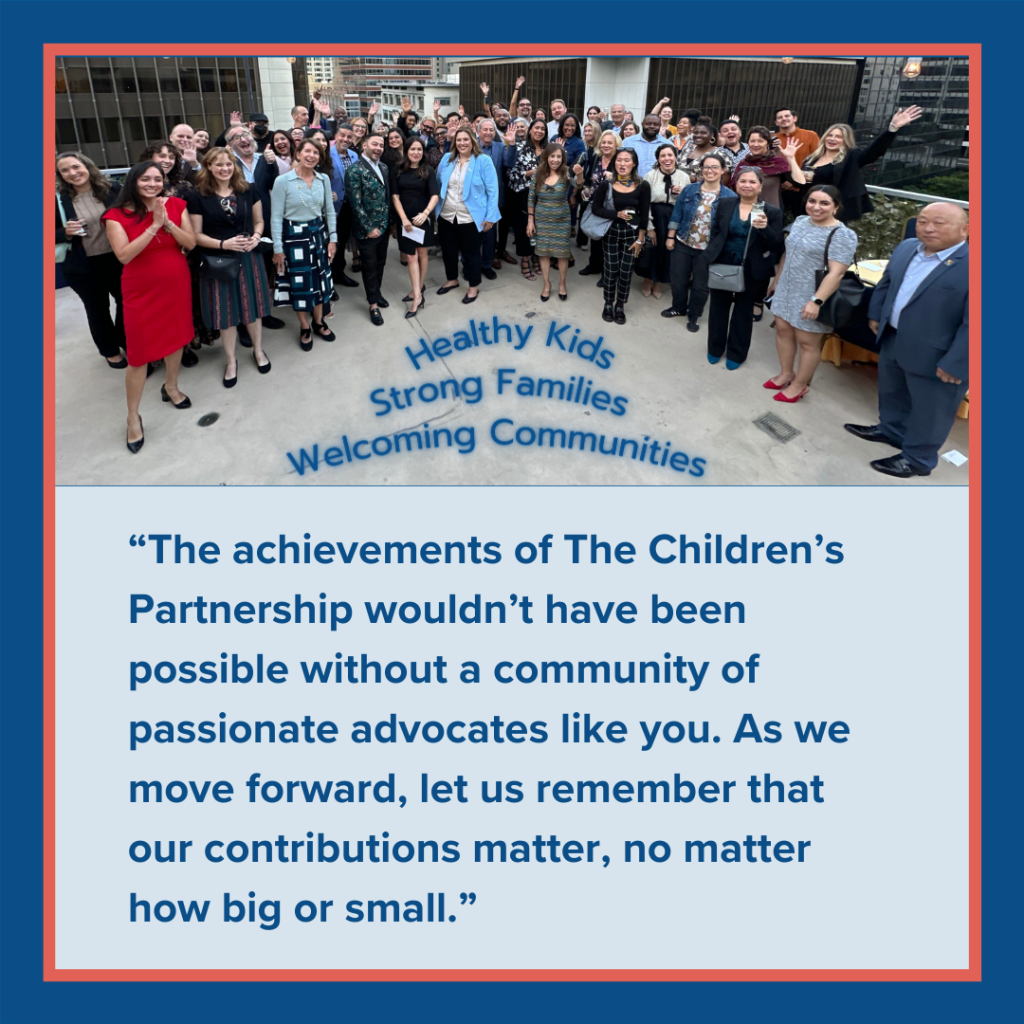
In October, we launched our year-long For Our Children’s Future: 30th Anniversary Speaker Series featuring renowned author, activist and enrolled member of the Lumbee Tribe Edgar Villanueva. During the discussion, we explored questions such as “What does our duty to nurture healthy, thriving children entail?” and “How does colonization persist in affecting us today?” For further insights, read TCP President Mayra E. Alvarez’s reflections on the conversation.
To stay updated on upcoming events in the ‘For Our Children’s Future: 30th Anniversary Speaker Series,’ sign up for updates.

Investing $8 Million: Peer-to-Peer Mental Health Programs in High Schools
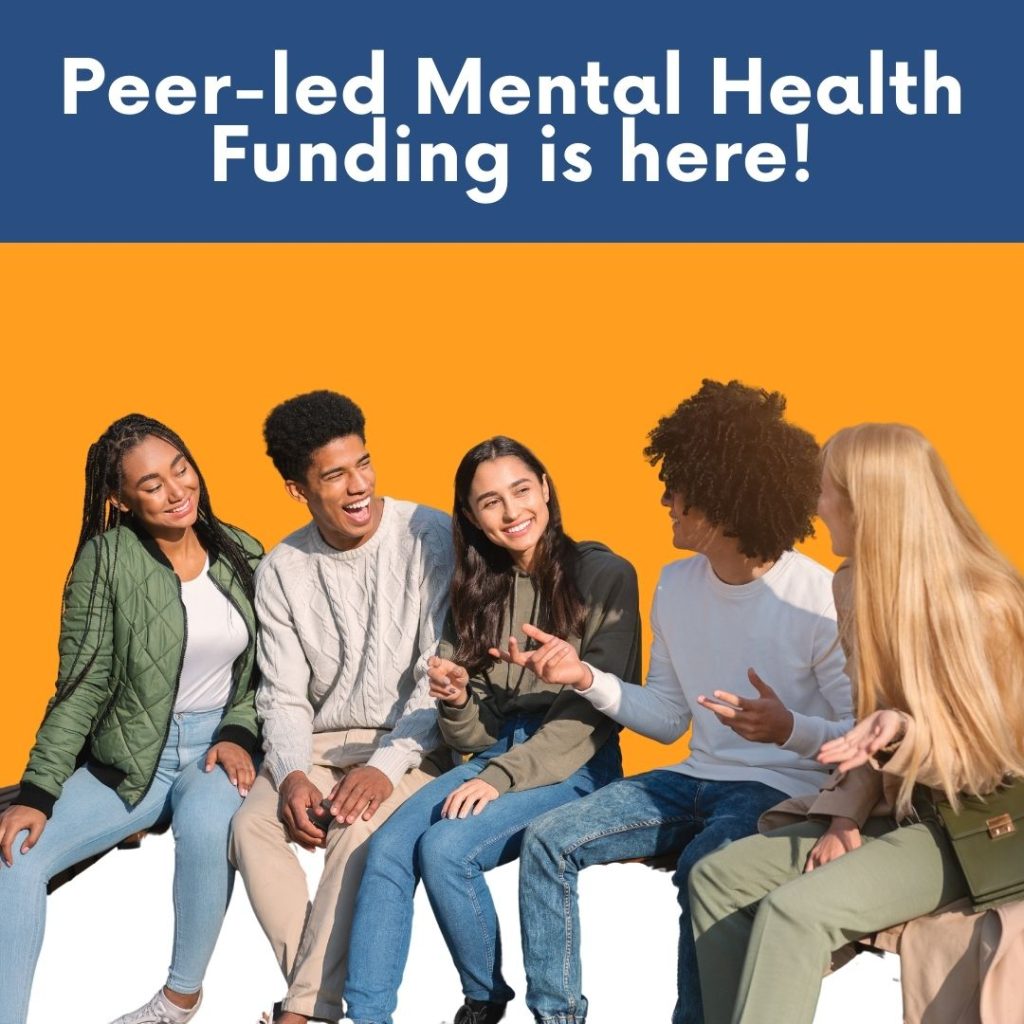
The Children’s Partnership and the California Department of Health Care Services have joined forces to allocate eight million dollars to eight chosen high schools throughout California. These funds will support innovative peer-to-peer mental health programs.
These grants stem directly from the collaborative efforts of the Hope, Healing, and Health Collective, led by The Children’s Partnership and the National Black Women’s Justice Institute (NBWJI), addressing the youth mental health crisis in 2021. The youth-led policy council aimed to pinpoint actionable solutions for policymakers to establish a culturally-responsive and gender-affirming mental health care system, particularly for youth of color. Youth peer-to-peer programs emerged as a key solution.
The Peer-to-Peer Pilot Demonstration strives to equip grantees with funding, technical support, and a learning community to develop peer-to-peer mental health initiatives on their school campuses. Priority will be given to schools with student populations at an increased risk of mental health challenges, prioritizing communities of color where youth have demonstrated significant disparities in unmet mental health needs and adverse outcomes, including suicide.
To learn more about the Peer-to-Peer Pilot Demonstration and the upcoming application process, join the webinar on Thursday, November 30, 2023, from 3pm to 4pm PT.
Let’s Talk: Immigrant Students & Families Webinar
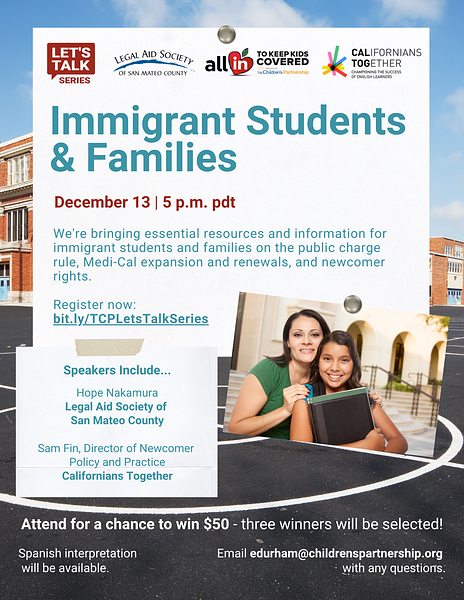
Join us Wednesday, December 13, 2023, from 5pm – 6:30pm PT for our “Let’s Talk: Immigrant Students and Families” discussion.
Topics:
- Understanding public charge: when it applies and exceptions
- Navigating Medi-Cal: Application, eligibility, and the importance of renewal
- Overview of newcomer educational rights
- Language learning in schools and available resources
Confirmed Speakers:
- Sam Fin, Director of Newcomer Policy and Practice from Californians Together
- Hope Nakamura, Legal Aid Society of San Mateo
